- Home
- Diane Gaston
A Pregnant Courtesan for the Rake Page 2
A Pregnant Courtesan for the Rake Read online
Page 2
He paused, unsure of his own motivation. He did want to tell her, though, he decided. ‘My father is the Marquess, but my mother was from India.’
He waited. Usually the women with whom he spent the most time found his looks exotic and appealing but, then, such women were typically interested only in sharing the pleasures of the night with him.
Ladies of the ton with marriageable daughters steered them away from him, however. Even though they knew he was wealthy. Even though some of those same ladies did not mind sharing his bed.
She took another sip of chocolate. ‘That does explain it. Were you born in India?’
‘I was. I left when I was ten.’ He would not tell her everything about his birth and those first ten years of his life. He never talked about it, although many who knew his father knew some of it. His partners in Vitium et Virtus knew nearly all and they’d accepted him as an equal since their days at school.
‘You must remember it then.’ She sounded truly interested now.
‘I do.’ He’d been remembering it that morning when she appeared.
‘Tell me,’ she said, licking off the chocolate from her lips and nearly driving India from his mind.
‘I remember the sounds and the smells and all the bright colours,’ he began.
He told her about the man charming the snake and others sleeping on a bed of nails or walking over hot coals. He told her of the music and the singing and dancing, of statues and paintings of gods. He talked of fragrant gardens and cool houses with pillows.
He did not tell her about his mother. Or about how his father shared his time between his Indian house and his English one on the other side of the garden.
‘I cannot imagine it,’ she said, her face alight with animation. ‘I would love to see such a place some day.’
His insides clenched in a familiar pain. He would never return there, never see those sights again.
He made himself smile. ‘Is Paris not enough for you?’
Her expressive face turned sad before she composed it again. ‘Paris...has not been unkind.’
How much was hidden in that statement?
The waiter brought a flaky confection filled with whipped cream and jam for her and, for him, a selection of cheeses and a loaf of bread still warm from the oven.
She nibbled on her pastry. ‘There is much beauty here in Paris. I gather some of the buildings, statues and art were almost lost during the Revolution. We can credit Napoleon for preserving them.’
‘If we must,’ he said, smiling wryly.
He was gratified she smiled in return.
‘I have seen very little of the city,’ he went on. His hosts had taken him to places where pleasure was more valued than architecture. ‘And now I have only today left.’
She lowered her pastry from her lips. ‘You have only today?’
‘I leave tomorrow.’ Somehow that information did not seem to disappoint her. ‘Tell me what sights I must see before I leave.’
Again her face animated. ‘Notre Dame, for certain. It is the most impressive and beautiful church one could ever see. The Louvre, as well. It is a beautiful building filled with beautiful art that once graced the houses of the aristocracy before the Revolution. And I suppose one should see the Palais-Royal. It is now filled with shops and restaurants.’
She went on to describe these sights in more detail as they finished their meal and drank the last of the coffee and chocolate. He paid the waiter and reluctantly stood. He could have remained all day in her presence, even though she’d told him nothing about herself. She wrapped her shawl around her, despite it being warm enough now to go without.
‘Thank you for breakfast,’ she said. ‘I did enjoy it.’
‘As did I,’ he added.
‘I suppose I must say adieu.’ She did not look happy about it, though.
‘I suppose...’
They left their table, but stood together on the pavement. The city had come alive while they’d eaten. The streets were full of carriages, horses and wagons. The pavement was abustle with workmen, servant girls, children and a few finely dressed gentlemen.
He held her elbow and guided her away from the fray.
Then he took her hand. ‘Do not say adieu. Stay with me. Show me the sights you have so wonderfully described.’
* * *
Cecilia glanced into his face. He had a memorable one—as handsome as any woman could wish. That was not what captivated her, however. Duncan had been handsome. After Duncan she’d learned not to be seduced by a handsome face.
His complexion was darker than one would expect from an Englishman. Knowing he was half-caste explained that. His hair was as dark as the night, worn longer than fashionable as if he did not trouble himself to visit the barber overmuch. His eyes were unexpected, though. They were hazel, the kind of eyes that changed colour from green to brown with the hue of his coat. When he fixed his gaze upon her she had the feeling he could see inside her, directly to her thoughts.
Perhaps that was why he asked her no questions about herself. He asked nothing of her, but shared about himself. What other man of her acquaintance would tell of his life before age ten? Duncan certainly had not.
What harm could there be in spending the day with him? She had no other obligations for today and he was leaving tomorrow. She liked his foreign looks and she relished the sound of his English accent, so familiar, so reminiscent of home. He was an easy companion, agreeable, unhurried and undemanding.
With those enthralling eyes.
Her hands started to shake and her knees grew weak, not from his allure, but from her decision. ‘I will show you Paris.’
He smiled and her knees grew weaker.
‘We should start at Notre Dame,’ she said quickly lest he notice he affected her. The famous cathedral was close by, its spire and towers visible from where they stood.
* * *
As they neared Notre Dame, she said, ‘Before we go inside, we must walk around the cathedral, because it looks very different from each side. You would hardly know it is one structure.’
They first faced the western façade, looking up at its symmetrical towers and carved stone. From where they stood they could see only the tip of the spire.
Slowly, they walked around to the north side. ‘See the rose window? How big it is? You will be astounded when we see it from the inside with the sun illuminating it.’ They continued walking. ‘You can see now how the cathedral is in the shape of a cross. All cathedrals are in the shape of a cross.’
He smiled at her. ‘You are quite knowledgeable about this.’
‘I suppose I am.’ She felt suddenly self-conscious.
She often had days free and the cathedral had become one of her favourite places. Sometimes she wandered for hours inside it, especially when she needed to feel peaceful.
They continued what was a fairly long walk around the building. The Seine was behind them, not too far from where he’d chased away the poor street children, busy now with boats and barges transporting people and goods up and down the river.
‘Flying buttresses,’ he pointed out, then smiled. ‘See? You are not the only one who is knowledgeable.’
Humour. It was as welcome as the clear summer air. She so rarely experienced the levity of humour. She could not help but return his smile.
They concluded their walk around the cathedral, talking of its architecture, and finally went inside. As they entered the church, the bell tolled the hour, its sound echoing against the stone walls.
Cecilia loved the inside of Notre Dame, loved the colours the rose windows cast upon the interior. Oliver Gregory seemed interested in everything she drew his attention to. Was he pretending? If so, he was very good at it.
Others filed into pews and soon a priest and his attendants appeared
at the huge altar. They had come at the time of the Catholic Mass.
‘Do you mind if we stay?’ she asked. There were so many English people who would abhor attending a Catholic Mass.
‘Not at all,’ he said.
They chose a pew in the back, but with a good view of the altar.
She liked the ritual, a little like her church at home, but different as well. Watching and listening to the Latin service drove other thoughts from her mind and calmed her. It made her forget the strange way she made her living and how lonely she was.
* * *
When the service was over he clasped her hand. ‘I am glad we stayed.’
They walked around the cathedral some more, marvelling at the windows, peering at the statues until they had seen enough.
As they came towards the long aisle to the door, she stopped him. ‘My name is Cecilia.’
Surely it would not hurt to tell him her given name.
She had never told anyone in Paris her real name, not since the day the captain came to tell her Duncan was killed, but she wanted this man to know. For one day she wanted to be herself, as she might have been had she never fallen under Duncan’s spell.
This lovely man beside her did not act as if she’d said anything unusual by giving her name so abruptly.
‘If I am to call you Cecilia,’ he said in a matter-of-fact tone, ‘you must call me Oliver.’
‘Oliver,’ she whispered.
‘Cecilia.’ He smiled.
It was not the done thing for a gentleman and a lady to call each other by their given names, not unless they grew up together from childhood. She’d known him only a few hours, but still it seemed natural that they should do so.
‘We should go to the Louvre next,’ she said.
The Louvre was another place Cecilia visited when she needed to remind herself that there was incredible beauty in the world. She loved the Renaissance art, especially the portrait called La Gioconda. She tried to imagine any other man of her acquaintance walking through the museum without any sign of boredom.
Was this man—Oliver—really what he seemed? Or was he pretending, hiding his true nature? Every day she pretended to be someone she was not. Every day she hid her real self. Today, though, she would be her real self, even if he were not.
When they again stepped outside, they could hear the bell of Notre Dame strike four o’clock, reminding her of when Oliver had last eaten.
‘There are restaurants at the Palais-Royal, if you are hungry.’ She was accustomed to going without food.
When she’d followed the drum with Duncan, she’d been allotted half his food rations, but when he could, he ate her portion as well as his own. She’d quickly learned not to complain.
‘Do you wish to eat?’ he asked.
Throughout the day, he’d checked on her wishes before stating his own, she noticed. Another technique of seduction? Or did he truly wish to fulfil her desires?
‘I know it is country hours, but I am quite famished,’ she admitted.
‘Then we must eat.’ He offered her his arm and they leisurely walked to the Palais-Royal, once the home of the Duc d’Orléans and, earlier, Cardinal Richelieu. The palais was not far from where she earned her money.
No. Cecilia Lockhart, who strolled by the side of this English gentleman, earned no money.
That was the job of Madame Coquette.
Chapter Two
The restaurant Oliver chose was the Beauvilliers, with its tables covered in white linen, shining silverware and sparkling crystal. He had dined there once already during his visit.
‘This restaurant is very expensive,’ Cecilia warned him as they were led to a table in a private corner.
‘Do not concern yourself,’ he told her. ‘I can afford it.’
He was used to ladies’ eyes kindling with greed when realising he was wealthy, but Cecilia merely nodded sceptically.
He laughed. ‘I assure you, Cecilia. Order whatever you desire.’
After they were seated he said, ‘There is something to be said about liberté, égalité, fraternité. I have yet to have any Paris high servant or shopkeeper regard me with disdain.’
She looked surprised. ‘That happens to you—being regarded with disdain?’
‘Because of how I look. Like a foreigner.’ In England, members of the ton and their servants often peered down their noses at him. It happened often enough in London shops as well.
‘I do not think you look all that remarkable,’ she said.
He laughed. ‘Thank you...I think.’
They perused the printed menu with its numerous choices for each course, deciding to begin with an onion soup followed by a platter of oysters and sausages. For the main course they chose beefsteak, then an entrée of duck. They could have ordered additional courses of fish and roast poultry or veal, but Cecilia said she would burst from that much food. Each course was accompanied by a different wine.
‘This meal reminds me of dinner parties at home,’ she said over the soup.
This was the most information about herself that she’d divulged yet. This was an aristocratic meal, so it was likely she came from an aristocratic family.
‘Home meaning England?’ he ventured.
Her expression sobered. He surmised she debated how much to disclose.
‘Surrey,’ she replied.
He smiled inwardly. It was as if she’d bared her soul to him.
‘We were practically neighbours, then,’ he said. ‘My father’s estate is in Kent.’
They went on to taste the oysters and sausage and sip the wine before she spoke again. ‘I am not welcome back in Surrey. My family disowned me when I ran away to Gretna Green to marry.’
This was a great deal to divulge and it made him sad for her. He knew how it felt to lose someone.
He was also disappointed to hear her mention a marriage.
Oliver usually did not care much about the details of a woman’s life, not the least of which was whether or not she was married. The woman’s apparent character and disposition of the moment were enough to satisfy him, but his reaction to this woman was different. He was intrigued by Cecilia. Maybe because she kept information about herself so close to her chest, he wanted to know all about her. Mostly he wanted to know what experience had put that sadness in her eyes. Had it been that Gretna Green elopement? Being disowned by her family?
He would continue to tread carefully, though.
‘They disowned you,’ he repeated as neutrally as he could.
‘My parents declared my husband to be unsuitable.’
He certainly knew that feeling. Most noble parents felt Oliver was unsuitable.
‘My husband thought they would come around if we were married. He thought my father would relent and turn over my dowry—but my father never did.’ She finished her glass of wine. ‘My husband had no fortune, no name to speak of, but he was dashing in his regimentals.’ Her voice turned sarcastic.
‘He was in the army?’ he guessed.
She nodded. ‘That is how I came to be in Paris. His regiment was ordered to Brussels and I came with him. After the battle at Waterloo, his regiment marched into France and, ultimately, Paris.’
Oliver had honoured his father’s wishes and had not purchased a commission. He regretted that decision to this day. He should have been fighting along with his friend Frederick.
She nodded as the waiter filled her wineglass again. ‘The battle was a horrific thing!’
‘You witnessed the battle?’ He was shocked.
Oliver had been there, too. At Waterloo. Unable to enlist, he’d gone to Brussels to be a part of it all, like so many others. Brussels had been filled with the British aristocracy and British tourists at the time. On the day of the battle he and other spectato
rs rode to the site where the troops were amassed. Never had he felt so helpless as he watched the carnage unfold. Cecilia would have witnessed horrors no woman should ever see.
She took a long sip of her wine, and her voice turned to a mere rasp. ‘So many men killed.’
Oliver had done what he could to pull wounded men off the field, but it had never felt like enough. After he’d returned to London from Brussels, it had taken him a long time to again lose himself in the pleasures of Vitium et Virtus. In fact, he’d never quite managed to free himself of Waterloo. A part of him always remembered the sights, the sounds. The agony.
‘I saw the battle, too,’ he told her.
Her eyes turned wary. ‘Oh? You were in the army?’
‘I was not.’ He pushed the food around on his plate. ‘My friend Frederick was, though.’
‘Did he live?’ she asked.
‘Yes.’ He lifted his glass to his lips. ‘Thank God.’
They had barely touched the oysters and sausage, but the waiter removed those dishes and brought the beefsteak, smothered in sauce. Another bottle of wine was opened and new glasses poured.
‘And your husband?’ he asked. ‘What happened to him?’
She shrank back as if his question had been an attack. ‘In the battle, do you mean?’
‘Yes.’ He had meant in the battle, but suddenly realised he wanted to know so much more.
‘He came through without a scratch.’ She sounded disdaining.
Oliver cut a piece of his beefsteak and brought it to his mouth.
She tapped the stem of her wineglass with her fingernail, making the crystal ring. ‘My husband died here in Paris. In a duel.’
‘A duel?’
‘Two years ago.’ She did not say more about the duel. ‘Since I was no longer welcome at home, I stayed in Paris.’ She drank her wine.
Oliver knew she was not the only British expatriate to find living in Paris more affordable than London.
She turned her attention to her food, apparently consumed by her own thoughts, but it seemed that she was pulling away from him. Perhaps she’d regretted confiding this much to him. He would not press her for more, no matter how he yearned to know.

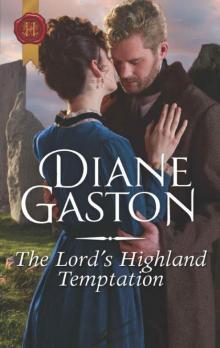 The Lord's Highland Temptation (HQR Historical)
The Lord's Highland Temptation (HQR Historical)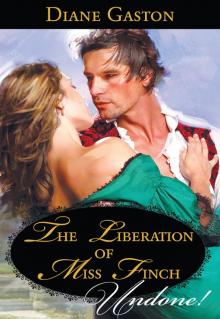 The Liberation of Miss Finch
The Liberation of Miss Finch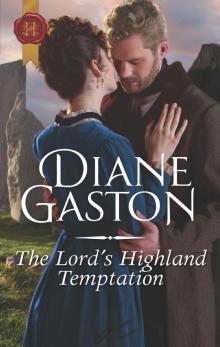 The Lord's Highland Temptation
The Lord's Highland Temptation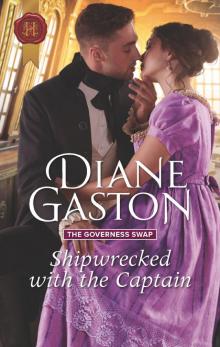 Shipwrecked with the Captain
Shipwrecked with the Captain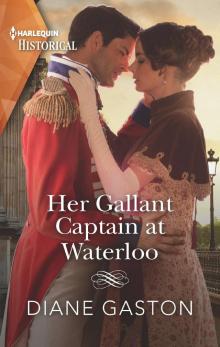 Her Gallant Captain at Waterloo
Her Gallant Captain at Waterloo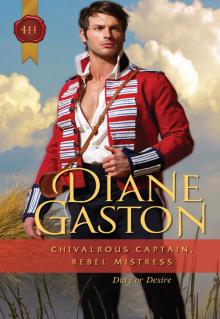 Chivalrous Captain, Rebel Mistress
Chivalrous Captain, Rebel Mistress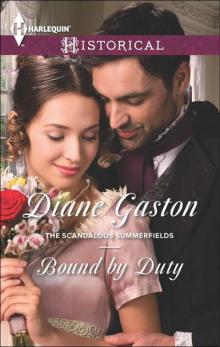 Bound by Duty
Bound by Duty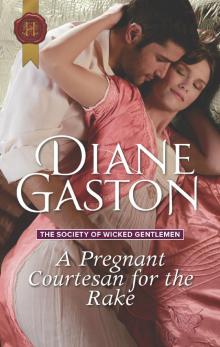 A Pregnant Courtesan for the Rake
A Pregnant Courtesan for the Rake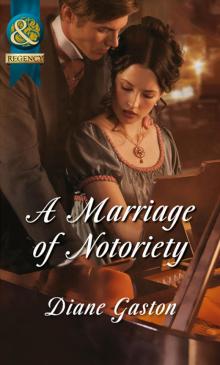 A Marriage of Notoriety
A Marriage of Notoriety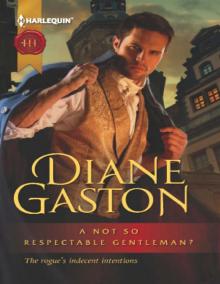 A Not So Respectable Gentleman?
A Not So Respectable Gentleman?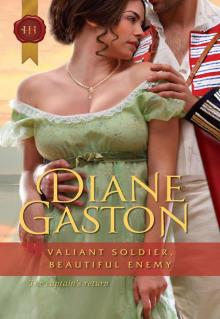 Valiant Soldier, Beautiful Enemy
Valiant Soldier, Beautiful Enemy A Reputation for Notoriety
A Reputation for Notoriety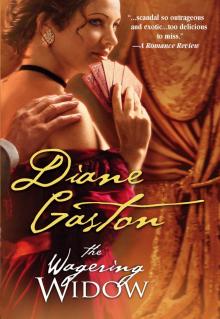 The Wagering Widow
The Wagering Widow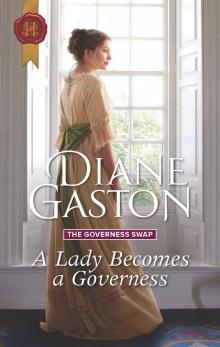 A Lady Becomes a Governess
A Lady Becomes a Governess Regency Wagers
Regency Wagers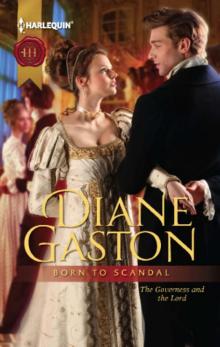 Born to Scandal
Born to Scandal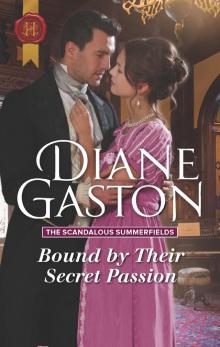 Bound by Their Secret Passion
Bound by Their Secret Passion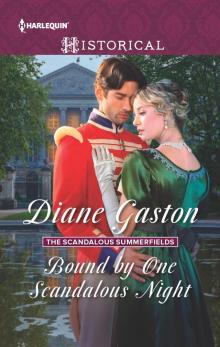 Bound by One Scandalous Night
Bound by One Scandalous Night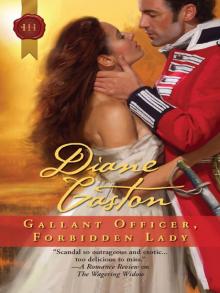 Gallant Officer, Forbidden Lady
Gallant Officer, Forbidden Lady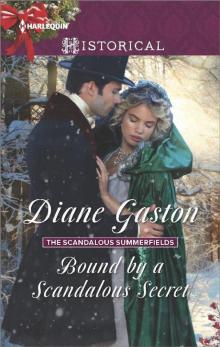 Bound by a Scandalous Secret (The Scandalous Summerfields)
Bound by a Scandalous Secret (The Scandalous Summerfields)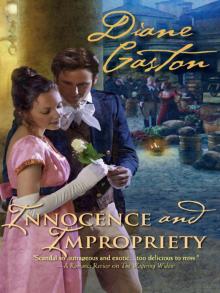 Innocence and Impropriety
Innocence and Impropriety